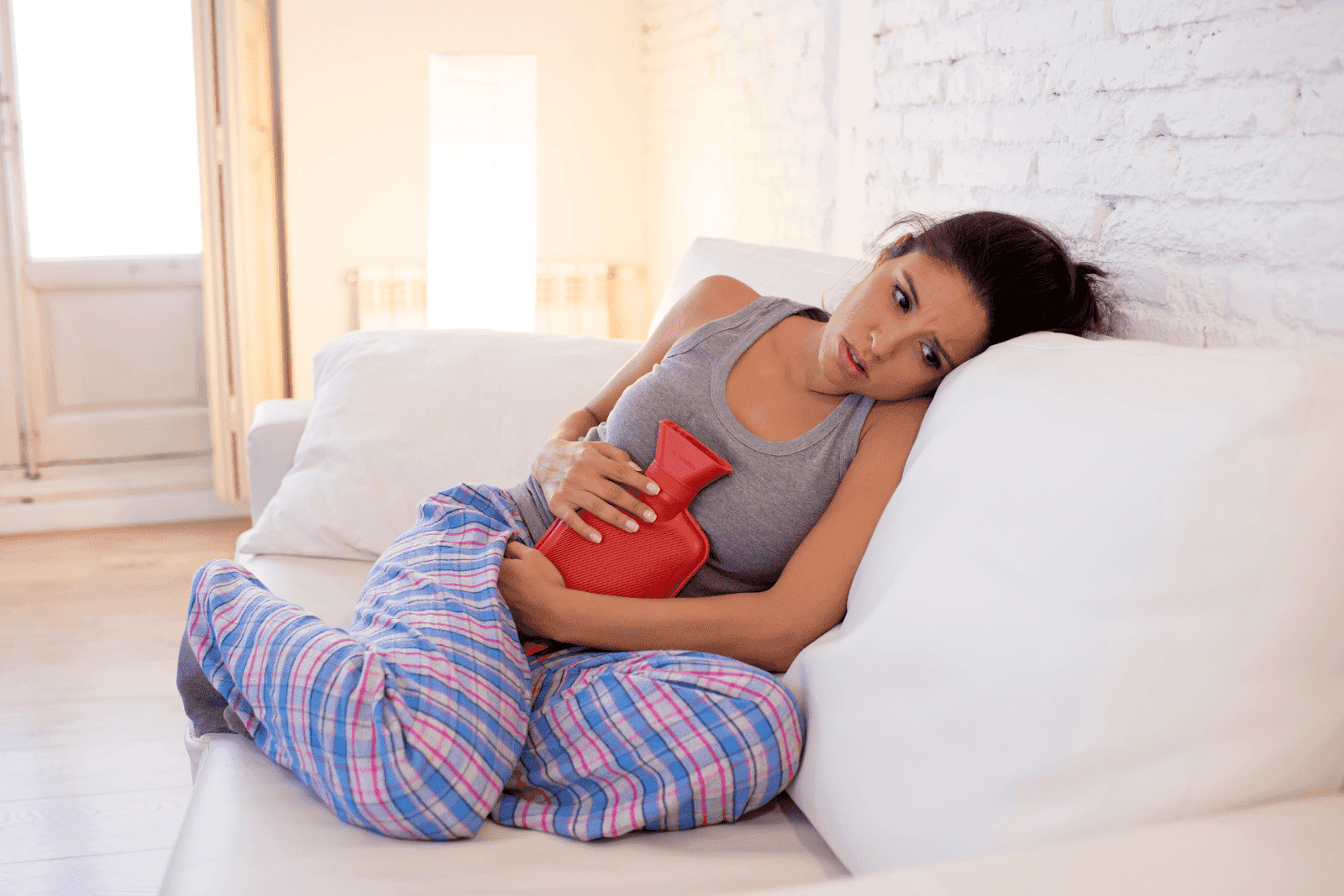Why Do I Have to Pee So Much During My Period?
Many people who menstruate notice an increase in the frequency of urination during their period. This common symptom can be puzzling and sometimes uncomfortable, leading to [...]
Read More
Medically reviewed by Alan Lucks | MD, Alan Lucks MDPC Private Practice - New York on October 16th, 2025.
Progesterone drops sharply before menstruation, reducing its mild fluid-retention effect and triggering increased urine production as the body sheds the extra fluid it held during the luteal phase.
Prostaglandins released during menstruation cause uterine contractions but also affect nearby bladder smooth muscle, increasing urgency and frequency without necessarily increasing actual urine volume.
The uterus swells to nearly double its normal size during menstruation and can press against the bladder, reducing its capacity and triggering more frequent voiding signals.
Increased caffeine or chocolate consumption during periods (common cravings) compounds the issue since caffeine is a diuretic that increases urine production by 30% within hours.
Conditions like endometriosis and uterine fibroids can worsen period-related urinary symptoms; persistent frequency, pain with urination, or blood in urine warrant evaluation beyond normal menstrual changes.
Many people who menstruate notice an increase in the frequency of urination during their period. This common symptom can be puzzling and sometimes uncomfortable, leading to questions about what is happening in the body and whether it is something to be concerned about. Understanding why this happens involves looking at the hormonal and physiological changes that occur throughout the menstrual cycle. This article explores the reasons behind frequent urination during menstruation, what it means for your health, and when to seek medical advice.
 Understanding the Menstrual Cycle and Its Effects on the Body
Understanding the Menstrual Cycle and Its Effects on the BodyThe menstrual cycle is a complex process regulated by fluctuating hormones, primarily estrogen and progesterone. These hormones not only prepare the uterus for a potential pregnancy but also influence various systems in the body, including the urinary tract.
During the menstrual cycle, especially in the days leading up to and during menstruation, hormone levels shift dramatically. These changes can affect fluid balance, bladder sensitivity, and the muscles around the pelvic area, all of which contribute to changes in urination patterns.
One of the key reasons for increased urination during your period is related to hormone-driven fluid retention. Before menstruation begins, progesterone levels drop sharply. Progesterone has a natural diuretic effect, meaning it helps the body get rid of excess fluid. When progesterone decreases, the body may retain more water, leading to bloating and swelling.
Once menstruation starts, the body begins to shed this excess fluid, which can cause an increase in urine production. This process helps reduce bloating, but also means you may find yourself needing to pee more often than usual.
During menstruation, the uterus sheds its lining, which involves increased blood flow to the pelvic area. This can cause the uterus to swell slightly and put pressure on the bladder, which sits just in front of the uterus. This pressure reduces the bladder’s capacity, making you feel the need to urinate more frequently, even if your bladder isn’t full.
Additionally, the pelvic muscles may become more sensitive or tense during this time, further contributing to the sensation of needing to pee.
Moreover, the interplay between hormonal changes and pelvic pressure can also lead to discomfort or cramping, which may further heighten awareness of bladder sensations. Some individuals may experience heightened sensitivity in their pelvic region, making them more attuned to bodily signals, including the urge to urinate. This can create a cycle where the discomfort of cramps and pressure amplifies the perception of needing to empty the bladder, leading to frequent trips to the restroom.
Furthermore, lifestyle factors such as diet and hydration levels can also play a role during this time. For instance, consuming caffeine or salty foods can exacerbate fluid retention and increase the frequency of urination. Staying hydrated is essential, but it’s important to be mindful of what you consume, as certain foods and drinks can intensify the symptoms associated with menstruation, including the need to urinate more often.
Besides hormonal changes and physical pressure, several other factors can influence why you might be peeing more during your period.
Many people experience cravings for salty or sweet foods during their period. Eating salty foods can cause the body to retain water, which, as mentioned earlier, leads to increased urination once the body starts to shed the excess fluid. On the other hand, staying well-hydrated is important during menstruation to help reduce bloating and maintain overall health, but it can also lead to more frequent trips to the bathroom.
Sometimes, the type of menstrual products used can affect how often you urinate. For example, wearing tight or bulky pads can create a sensation of pressure or discomfort around the pelvic area, which may mimic the feeling of needing to pee. Similarly, tampons can sometimes cause mild irritation or pressure that influences bladder sensitivity.
While frequent urination during your period is usually normal, it’s important to be aware of symptoms that could indicate a urinary tract infection (UTI) or other health issues. UTIs are common in people who menstruate and can cause symptoms such as burning during urination, urgency, and pelvic pain. If you experience these symptoms, it’s important to seek medical advice promptly.
Frequent urination during your period is typically harmless and related to the natural changes in your body. However, there are times when it may signal a need for medical evaluation.
Pain or burning during urination: This could indicate a urinary tract infection or other irritation.
Blood in urine: While some spotting during menstruation is normal, blood in the urine itself should be evaluated.
Severe pelvic pain: Intense pain that is not typical for your period may require further investigation.
Sudden changes in urination patterns: If you notice a significant increase in frequency or urgency that is new or worsening, it’s best to consult a healthcare provider.
If you experience any of these symptoms, using a reliable telehealth service like Doctronic.ai can be a convenient and affordable way to get professional medical advice quickly. Doctronic offers 24/7 telehealth visits with licensed doctors across all 50 states, making it easier than ever to get the care you need without leaving your home.
Managing symptoms during your period can sometimes feel overwhelming, especially when you’re unsure whether what you’re experiencing is normal. Doctronic.ai is revolutionizing access to healthcare by providing fast, AI-powered doctor visits that combine the latest in medical research with personalized care.
With Doctronic, you can get answers to your questions about frequent urination or any other period-related concerns in seconds. The AI doctor synthesizes peer-reviewed medical knowledge to provide clear, evidence-based information tailored to your situation. If you need further evaluation or treatment, you can easily schedule an affordable video visit with a real doctor through the platform.
Millions of people have already trusted Doctronic for their healthcare needs, appreciating the convenience, affordability, and personalized attention they receive. Whether you want to understand why you have to pee so much during your period or need help managing other symptoms, Doctronic.ai is a valuable resource to keep in your health toolkit.
While frequent urination during menstruation is usually temporary and benign, there are some practical steps you can take to ease discomfort and manage symptoms effectively.
Drinking plenty of water helps flush out excess fluids and reduce bloating. However, try to avoid consuming large amounts of caffeine or alcohol, as these can irritate the bladder and increase urination frequency.
Select menstrual products that feel comfortable and do not create unnecessary pressure on your pelvic area. Experimenting with different types or brands may help you find what works best for your body.
Strengthening your pelvic floor muscles through exercises like Kegels can improve bladder control and reduce urgency. These exercises also support overall pelvic health, which is beneficial during menstruation.
Limiting salty foods can help reduce fluid retention and the need to urinate frequently. Eating a balanced diet rich in fruits, vegetables, and whole grains supports overall well-being during your cycle.
 Your Health Matters: Managing Period-Related Urination Changes
Your Health Matters: Managing Period-Related Urination ChangesFrequent urination during your period is a common experience caused by hormonal changes, fluid retention, and physical pressure on the bladder. While usually nothing to worry about, it’s important to pay attention to your body and seek medical advice if you notice unusual symptoms or discomfort.
Thanks to advances in healthcare technology, getting reliable medical guidance has never been easier. Doctronic.ai offers fast, affordable, and personalized care that fits your schedule and lifestyle. Whether you have questions about your period symptoms or need a telehealth consultation, Doctronic is here to help you navigate your health with confidence.
Don't let period-related symptoms disrupt your life. With Doctronic, you can access immediate, personalized medical advice from the comfort of your home. Our AI-powered platform is designed to provide you with fast, accurate, and personalized healthcare solutions. Whether you're experiencing frequent urination during your period or have other health concerns, Doctronic is here to offer you the most modern, peer-reviewed medical information available. Say goodbye to waiting rooms and schedule conflicts; embrace the convenience of 24/7 care that remembers every detail about you. Skip the line. Talk to an AI Doctor Now, for free.
Frequent urination during your period is typically a normal hormonal response that resolves within a few days. If symptoms are severe, persist throughout your cycle, or include pain, Doctronic can help determine whether further evaluation is needed.
Many people who menstruate notice an increase in the frequency of urination during their period. This common symptom can be puzzling and sometimes uncomfortable, leading to [...]
Read More